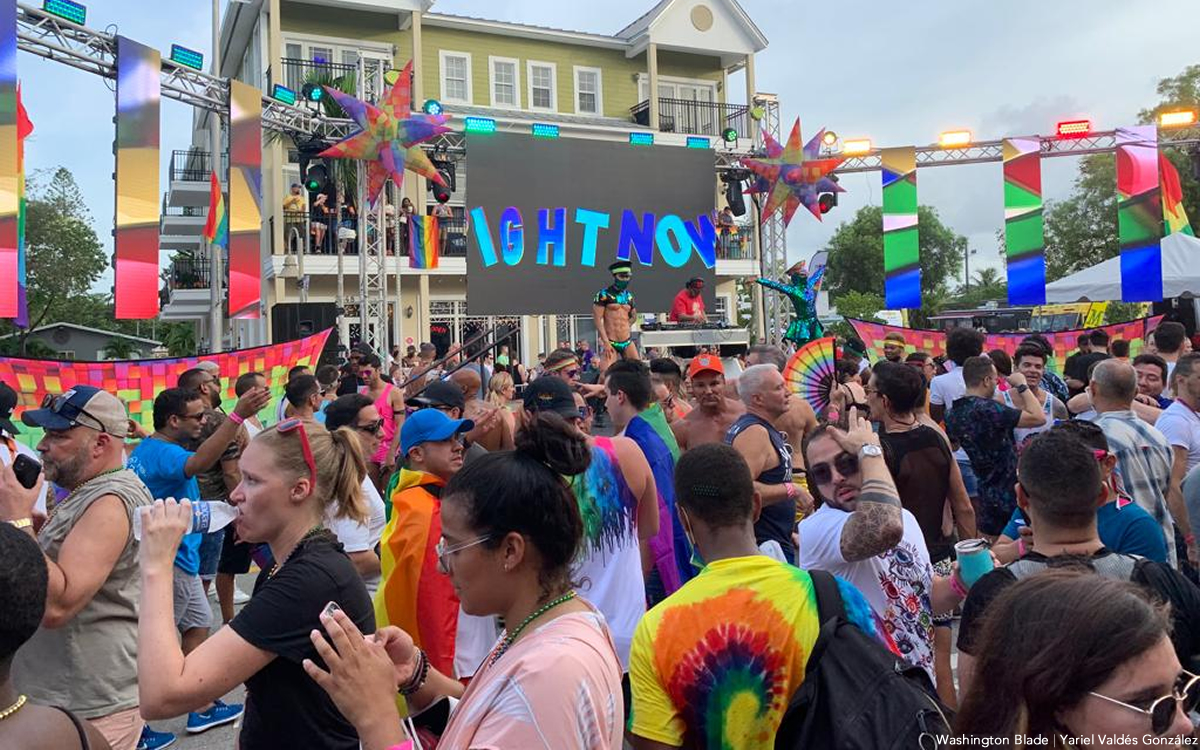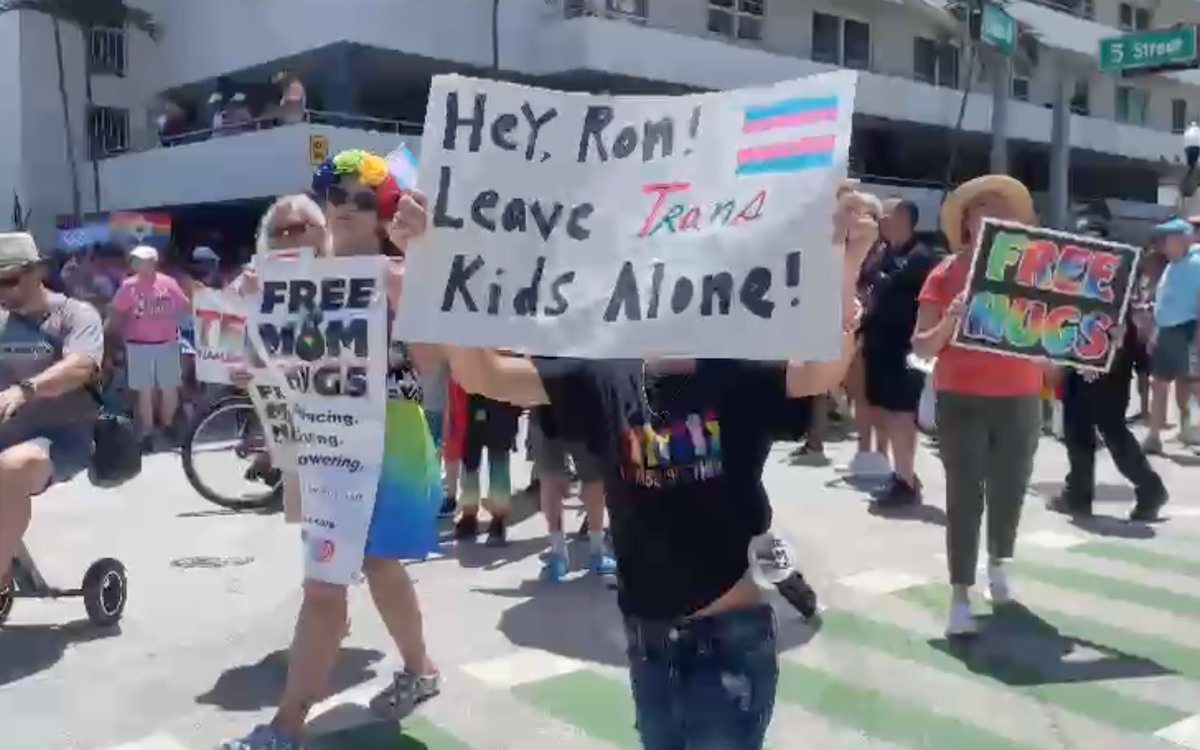National
Anti-LGBTQ laws, drag bans loom over Pride celebrations
Organizers in Florida, Texas, Montana, Tennessee coping with new restrictions

Anti-LGBTQ and anti-drag laws that Republican governors have signed have prompted Pride organizers to reconsider or even cancel their events this year.
The Bozanich Photography Collaborative, which organizes St. Cloud Pride in Florida, in its statement that announced the cancellation of its June 10 event noted the state “has recently passed a number of laws that target the LGBTQIA+ community” and they have “created a climate of fear and hostility for LGBTQIA+ people.”
Florida Gov. Ron DeSantis on May 17 — the International Day Against Homophobia, Biphobia and Transphobia — signed bills that ban gender-affirming health care for minors, restrict pronoun usage in schools and require public buildings and other facilities’ restrooms and locker rooms to have “separate facilities for men and women based on biological sex.” DeSantis on that day also signed House Bill 1438, which “protects children from explicitly adult performances in all venues — including drag shows and strip clubs” and “imposes fines and license suspension for hotels and restaurants that admit a child into an adult performance.”
The Republican presidential candidate last year filed a complaint against a Miami restaurant after LibsofTikTok broadcast a video of children attending a drag show.
The DeSantis administration this year has sought to revoke the liquor license of the Hyatt Regency Miami and filed a complaint against the Orlando Philharmonic Plaza Foundation after children attended drag shows at the respective locations.
Tampa Pride on May 18 announced the cancellation of its “Pride on the River” event. Organizers of Pridefest in Port St. Lucie only allowed those who were at least 21 years old to attend their annual event that took place in April.
Hamburger Mary’s in Orlando has sued DeSantis over HB 1438.

The annual Stonewall Pride Parade and Street Festival is scheduled to take place in Wilton Manors on June 17.
Stonewall Pride CEO Jeffrey Sterling on Monday during a telephone interview with the Washington Blade pointed out Wilton Drive, the road on which the parade and festival will take place, is a state road.
He said performers and vendors will have to abide by a series of rules that include no nudity, no lewd conduct and no vulgarity or overtly sexual language. Sterling admitted HB 1438 and the other anti-LGBTQ bills that DeSantis signed “indirectly” prompted Stonewall Pride to implement them, but he stressed they do not apply to those who attend the parade and festival.
Sterling denied reports that suggest drag queens will not be allowed to perform.
“We need to be proud of the beauty of our culture while keeping in mind who we are entertaining,” he said. “Our standards should be that which we would use around our own children or our families’ nieces or nephews. We are performing for all ages, so the youngest in the audience should dictate the minimum standards we should adhere to.”
Miami Beach Pride took place on April 16, less than a week after Equality Florida and the Florida Immigrant Coalition issued a travel advisory for the state. The event took place before DeSantis signed HB 1438 and the three other anti-LGBTQ laws.

The third annual PensaPride will take place in Pensacola in Florida’s Panhandle on June 24.
Sydney Robinson, who is a member of PensaPride’s board of directors, during a June 1 telephone interview with the Blade noted the all-day festival is a sober event and “family-friendly, open to all ages.”
She noted drag queens typically perform at PensaPride, but organizers are “still sort of grappling to try and do something or if we want to avoid it altogether because of the new law.” Robinson was nevertheless adamant that Pride events should continue to take place in Florida, despite DeSantis and the anti-drag bill he signed.
“I’m really disappointed with any Pride events that cancel for that reason because I think there is a way to have a vibrant Pride event that doesn’t have drag,” she said. “If you really want to follow the law, if that’s your main concern, you could easily do a wonderful Pride event and just not have that element involved.”
“On the other end it’s like well Pride is a protest,” added Robinson. “That was the basis of Pride from the start.”

‘We’re more motivated than ever’
Montana Gov. Greg Gianforte on May 22 signed a bill that bans drag story hours in public schools and libraries and restricts “sexually oriented performances” on public property. (His nonbinary child urged him to veto anti-LGBTQ bills that reached his desk during this year’s legislative session.)
Missoula Pride will take place from June 16-18.
“We’re more motivated than ever to put on just one big hell of a Pride festival,” Andy Nelson, executive director of the Western Montana LGBTQ+ Community Center, which organizes Missoula Pride, told the Blade on June 2 during a telephone interview. “This legislative session here in Montana has been devastating and we just need to come together as a community more than ever.”
Nelson noted the bill that Gianforte signed is specific to public libraries and schools. Nelson said drag queens will perform at Missoula Pride as they normally do.
“As far as drag performers performing at our street party in downtown Missoula, we’re good to go,” Nelson told the Blade. “And so we’re going to have a bunch of queens up there, like usual, doing their thing. They’ll be in the parade and we’re still going to have multiple drag events throughout the weekend.”

A document the Department of Homeland Security shared with law enforcement and government agencies on May 11 notes anti-LGBTQ threats are increasing and are linked to “drag-themed events, gender-affirming care and LGBTQIA+ curricula in schools.” The document also warns of the potential increase in attacks against health care providers and businesses that specifically cater to LGBTQ people.
Police in Coeur d’Alene, Idaho last June arrested 31 armed white nationalists who were protesting a Pride event
“We were definitely on edge,” said Nelson, who noted Coeur d’Alene is less than three hours from Missoula and the arrests took place days after Missoula Pride. “What happened there is not out of the question, that it could happen here as well.”
Nelson noted a small group of neo-Nazis with AR-15s in March protested an International Trans Day of Visibility event that took place at Missoula’s courthouse. He said a private security team and members of the Missoula Police Department will be on hand during Pride.
“We’re definitely keeping safety and security top of mind,” said Nelson.

Tennessee Gov. Bill Lee on March 2 signed Senate Bill 2, which imposes fines and even jail time for “male or female impersonators who provide entertainment that appeals to a prurient interest” on public property or where children are present.
Friends of George’s, a Memphis-based LGBTQ theater company, challenged SB 2 in federal court.
U.S. District Court Judge Thomas L. Parker of the U.S. District Court for the Western District of Tennessee on June 2 declared SB 2, which is also known as the Adult Entertainment Act, unconstitutional. The same federal judge temporarily blocked the law hours before it was to have taken effect.
Tennessee Equality Project Executive Director Chris Sanders on Monday noted to the Blade that Pride events took place in Memphis, Cookeville and in other cities across the state over the past weekend.
Sanders said drag queens performed in a public park during Columbia Pride that took place on Sunday. He noted some Pride celebrations “probably did make some contingency plans or change the way their celebration went on, but many continued to have drag as part of their celebrations.”
Sanders told the Blade that activists in Tennessee remain “extremely stressed, particularly about the anti-trans laws.”
The American Civil Liberties Union has filed a lawsuit against the state law that bans gender-affirming care for anyone who is under 18 years old. Sanders noted that statute “continues to hang over everything,” but Parker’s ruling was something to celebrate.
“People got a bit of relief, obviously, because of the drag ruling and people are very excited about that,” said Sanders.
Texas anti-drag bill has ‘broad and vague wording’
Texas Gov. Greg Abbott on June 2 signed a law that bans gender-affirming health care for minors in his state. Senate Bill 12 — which would “regulate sexually oriented performances” and “those performances on the premises of a commercial enterprise, on public property, or in the presence of an individual younger than 18 years of age” — is currently awaiting the Republican governor’s signature.
Nick Harpster, the public relations and advocacy coordinator of Lubbock Pride, on June 1 noted to the Blade during a telephone interview that SB 12 would take effect after his city’s Pride events if Abbott were to sign it into law.
He said SB 12 has “such a broad and vague wording and it’s left up to so much interpretation,” and questioned how it may specficially impact the Dallas Cowboy cheerleaders. Harpster said Texas lawmakers have definitely targeted drag queens with SB 12 and another bill that sought to defund public libraries that host drag queen story hours.
“That’s been the goal from the get go,” said Harpster.
Harpster said Lubbock Pride “may have to do some things differently” next year if Abbott signs SB 12. In the meantime, drag performances and drag story times are among the events that will take place during this year’s Lubbock Pride that will take place on June 10.

Dawn Ennis, Christopher Kane, Michael Key and Brody Levesque contributed to this story.
State Department
Rubio mum on Hungary’s Pride ban
Lawmakers on April 30 urged secretary of state to condemn anti-LGBTQ bill, constitutional amendment

More than 20 members of Congress have urged Secretary of State Marco Rubio to publicly condemn a Hungarian law that bans Pride events.
California Congressman Mark Takano, a Democrat who co-chairs the Congressional Equality Caucus, and U.S. Rep. Bill Keating (D-Mass.), who is the ranking member on the House Foreign Affairs Committee’s Europe Subcommittee, spearheaded the letter that lawmakers sent to Rubio on April 30.
Hungarian lawmakers in March passed a bill that bans Pride events and allow authorities to use facial recognition technology to identify those who participate in them. MPs last month amended the Hungarian constitution to ban public LGBTQ events.
“As a NATO ally which hosts U.S. service members, we expect the Hungarian government to abide by certain values which underpin the historic U.S.-Hungary bilateral relationship,” reads the letter. “Unfortunately, this new legislation and constitutional amendment disproportionately and arbitrarily target sexual and gender minorities.”
Prime Minister Viktor Orbán’s government over the last decade has moved to curtail LGBTQ and intersex rights in Hungary.
A law that bans legal recognition of transgender and intersex people took effect in 2020. Hungarian MPs that year also effectively banned same-sex couples from adopting children and defined marriage in the constitution as between a man and a woman.
An anti-LGBTQ propaganda law took effect in 2021. The European Commission sued Hungary, which is a member of the European Union, over it.
MPs in 2023 approved the “snitch on your gay neighbor” bill that would have allowed Hungarians to anonymously report same-sex couples who are raising children. The Budapest Metropolitan Government Office in 2023 fined Lira Konyv, the country’s second-largest bookstore chain, 12 million forints ($33,733.67), for selling copies of British author Alice Oseman’s “Heartstopper.”
Former U.S. Ambassador to Hungary David Pressman, who is gay, participated in the Budapest Pride march in 2024 and 2023. Pressman was also a vocal critic of Hungary’s anti-LGBTQ crackdown.
“Along with years of democratic backsliding in Hungary, it flies in the face of those values and the passage of this legislation deserves quick and decisive criticism and action in response by the Department of State,” reads the letter, referring to the Pride ban and constitutional amendment against public LGBTQ events. “Therefore, we strongly urge you to publicly condemn this legislation and constitutional change which targets the LGBTQ community and undermines the rights of Hungarians to freedom of expression and peaceful assembly.”
U.S. Reps. Pramila Jayapal (D-Wash.), Sarah McBride (D-Del.), Jim Costa (D-Calif.), James McGovern (D-Mass.), Gerry Connolly (D-Va.), Summer Lee (D-Pa.), Joaquin Castro (D-Texas), Julie Johnson (D-Texas), Ami Bera (D-Calif.), Mark Pocan (D-Wis.), Lloyd Doggett (D-Texas), Becca Balint (D-Vt.), Gabe Amo (D-R.I.), Ted Lieu (D-Calif.), Robert Garcia (D-Calif.), Dina Titus (D-Nev.), Raja Krishnamoorthi (D-Ill.), Jan Schakowsky (D-Ill.) and Mike Quigley (D-Ill.) and Del. Eleanor Holmes Norton (D-D.C.) signed the letter alongside Takano and Keating.
A State Department spokesperson on Wednesday declined to comment.
Federal Government
HRC memo details threats to LGBTQ community in Trump budget
‘It’s a direct attack on LGBTQ+ lives’

A memo issued Monday by the Human Rights Campaign details threats to LGBTQ people from the “skinny” budget proposal issued by President Donald Trump on May 2.
HRC estimates the total cost of “funding cuts, program eliminations, and policy changes” impacting the community will exceed approximately $2.6 billion.
Matthew Rose, the organization’s senior public policy advocate, said in a statement that “This budget is more than cuts on a page—it’s a direct attack on LGBTQ+ lives.”
“Trump is taking away life-saving healthcare, support for LGBTQ-owned businesses, protections against hate crimes, and even housing help for people living with HIV,” he said. “Stripping away more than $2 billion in support sends one clear message: we don’t matter. But we’ve fought back before, and we’ll do it again—we’re not going anywhere.”
Proposed rollbacks or changes at the U.S. Department of Health and Human Services will target the Ryan White HIV/AIDS Program, other programs related to STI prevention, viral hepatitis, and HIV, initiatives housed under the Substance Abuse and Mental Health Services Administration, and research by the National Institutes of Health and Agency for Healthcare Research and Quality.
Other agencies whose work on behalf of LGBTQ populations would be jeopardized or eliminated under Trump’s budget include the U.S. Department of Housing and Urban Development, the U.S. Department of Justice, the U.S. Small Business Administration, and the U.S. Department of Education.
U.S. Supreme Court
Supreme Court allows Trump admin to enforce trans military ban
Litigation challenging the policy continues in the 9th Circuit

The U.S. Supreme Court on Tuesday allowed the Trump-Vance administration to enforce a ban on transgender personnel serving in the U.S. Armed Forces pending the outcome of litigation challenging the policy.
The brief order staying a March 27 preliminary injunction issued by the U.S. District Court for the Western District of Washington notes the dissents from liberal Justices Sonia Sotomayor, Elena Kagan, and Ketanji Brown Jackson.
On the first day of his second term, President Donald Trump issued an executive order requiring Secretary of Defense Pete Hegseth to effectuate a ban against transgender individuals, going further than efforts under his first administration — which did not target those currently serving.
The DoD’s Feb. 26 ban argued that “the medical, surgical, and mental health constraints on individuals who have a current diagnosis or history of, or exhibit symptoms with, gender dysphoria are incompatible with the high mental and physical standards necessary for military service.”
The case challenging the Pentagon’s policy is currently on appeal before the U.S. Court of Appeals for the Ninth Circuit. The lead plaintiff is U.S. Navy Commander Emily Shilling, who is joined in the litigation by other current transgender members of the armed forces, one transgender person who would like to join, and a nonprofit whose members either are transgender troops or would like to be.
Lambda Legal and the Human Rights Campaign Foundation, both representing the plaintiffs, issued a statement Tuesday in response to the Supreme Court’s decision:
“Today’s Supreme Court ruling is a devastating blow to transgender servicemembers who have demonstrated their capabilities and commitment to our nation’s defense.
“By allowing this discriminatory ban to take effect while our challenge continues, the Court has temporarily sanctioned a policy that has nothing to do with military readiness and everything to do with prejudice.
“Transgender individuals meet the same standards and demonstrate the same values as all who serve. We remain steadfast in our belief that this ban violates constitutional guarantees of equal protection and will ultimately be struck down.”
U.S. Solicitor General D. John Sauer noted that courts must show “substantial deference” to DoD decision making on military issues.
“The Supreme Court’s decision to allow the military ban to go into effect is devastating for the thousands of qualified transgender servicemembers who have met the standards and are serving honorably, putting their lives on the line for their country every single day,” said GLAD Law Senior Director of Transgender and Queer Rights Jennifer Levi. “Today’s decision only adds to the chaos and destruction caused by this administration. It’s not the end of the case, but the havoc it will wreak is devastating and irreparable. History will confirm the weight of the injustice done today.”
“The Court has upended the lives of thousands of servicemembers without even the decency of explaining why,” said NCLR Legal Director Shannon Minter. “As a result of this decision, reached without benefit of full briefing or argument, brave troops who have dedicated their lives to the service of our country will be targeted and forced into harsh administrative separation process usually reserved for misconduct. They have proven themselves time and time again and met the same standards as every other soldier, deploying in critical positions around the globe. This is a deeply sad day for our country.”
Levi and Minter are the lead attorneys in the first two transgender military ban cases to be heard in federal court, Talbott v. Trump and Ireland v. Hegseth.
U.S. Rep. Mark Takano (D-Calif.) issued a statement on behalf of the Congressional Equality Caucus, where he serves as chair.
“By lifting the lower court’s preliminary injunction and allowing Trump to enforce his trans troop ban as litigation continues, the Supreme Court is causing real harm to brave Americans who simply want to serve their nation in uniform.
“The difference between Donald Trump, a draft dodger, and the countless brave Americans serving their country who just happen to be trans couldn’t be starker. Let me be clear: Trump’s ban isn’t going to make our country safer—it will needlessly create gaps in critical chains of military command and actively undermine our national security.
“The Supreme Court was absolutely wrong to allow this ban to take effect. I hope that lower courts move swiftly so this ban can ultimately be struck down.”
SPARTA Pride also issued a statement:
“The Roberts Court’s decision staying the preliminary injunction will allow the Trump purge of transgender service members from the military to proceed.
“Transgender Americans have served openly, honorably, and effectively in the U.S. Armed Forces for nearly a decade. Thousands of transgender troops are currently serving, and are fully qualified for the positions in which they serve.
“Every court up to now has found that this order is unconstitutional. Nevertheless, the Roberts Court – without hearing any evidence or argument – decided to allow it to go forward. So while the case continues to be argued, thousands of trans troops will be purged from the Armed Forces.
“They will lose their jobs. They will lose their commands, their promotions, their training, pay and benefits, and time. Their units will lose key players; the mission will be disrupted. This is the very definition of irreparable harm.”
Imara Jones, CEO of TransLash Media, issued the following statement:
“The Supreme Court’s decision to uphold Trump’s ban on transgender soldiers in the military, even as the judicial process works its way through the overall question of service, signals that open discrimination against trans people is fair game across American society.
“It will allow the Trump Administration to further advance its larger goal of pushing trans people from mainstream society by discharging transgender military members who are currently serving their country, even at a time when the military has struggled recently to meet its recruiting goals.
“But even more than this, all of my reporting tells me that this is a further slide down the mountain towards authoritarianism. The hard truth is that governments with authoritarian ambitions have to separate citizens between who is worthy of protection and who’s not. Trans people are clearly in the later category. And this separation justifies the authoritarian quest for more and more power. This appears to be what we are witnessing here and targeting trans people in the military is just a means to an end.”
-

 The Vatican14 hours ago
The Vatican14 hours agoAmerican cardinal chosen as next pope
-

 a&e features20 hours ago
a&e features20 hours agoYour guide to the many Pride celebrations in D.C. region
-

 U.S. Supreme Court2 days ago
U.S. Supreme Court2 days agoSupreme Court allows Trump admin to enforce trans military ban
-

 District of Columbia2 days ago
District of Columbia2 days agoWorldPride permits for National Mall have yet to be approved












